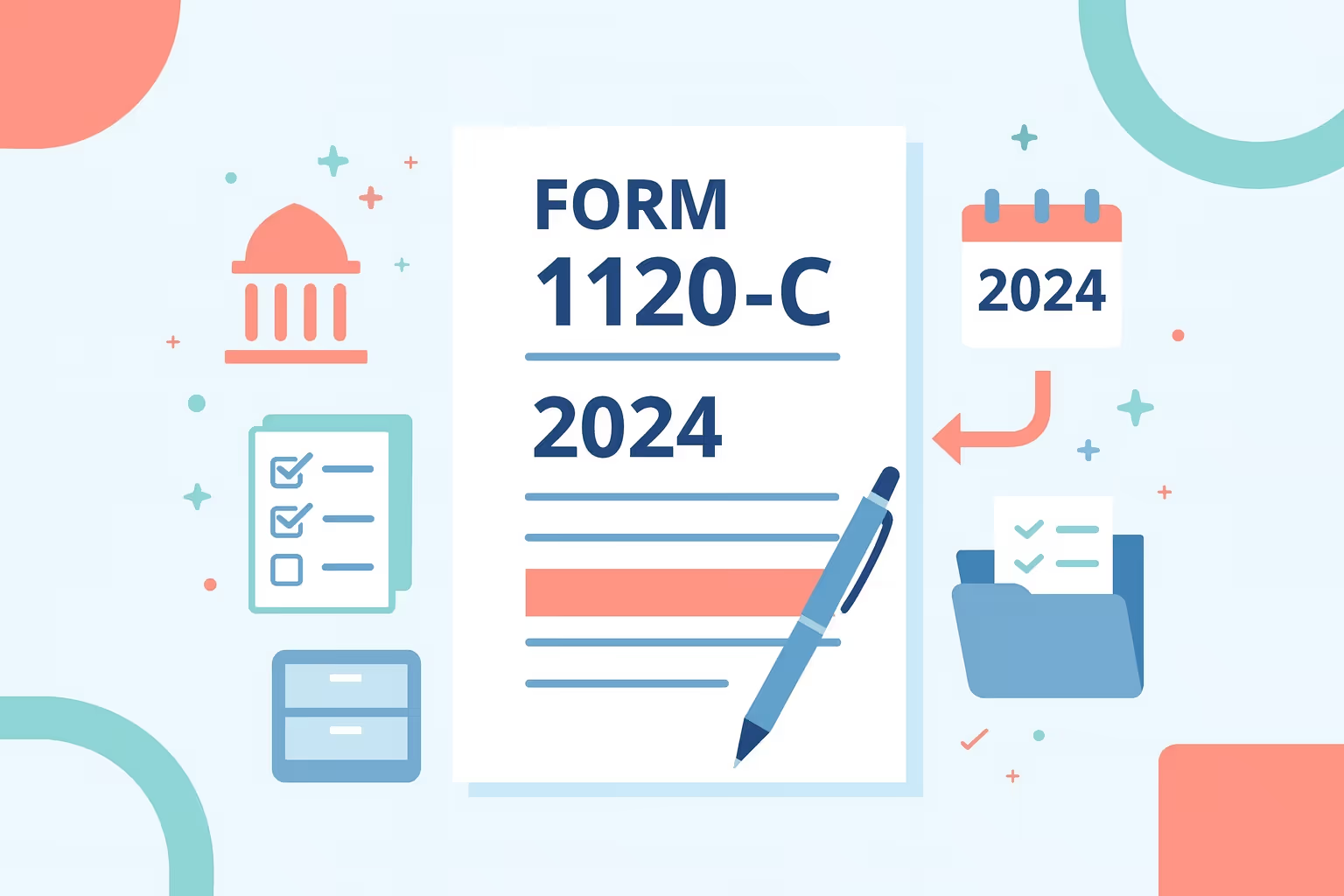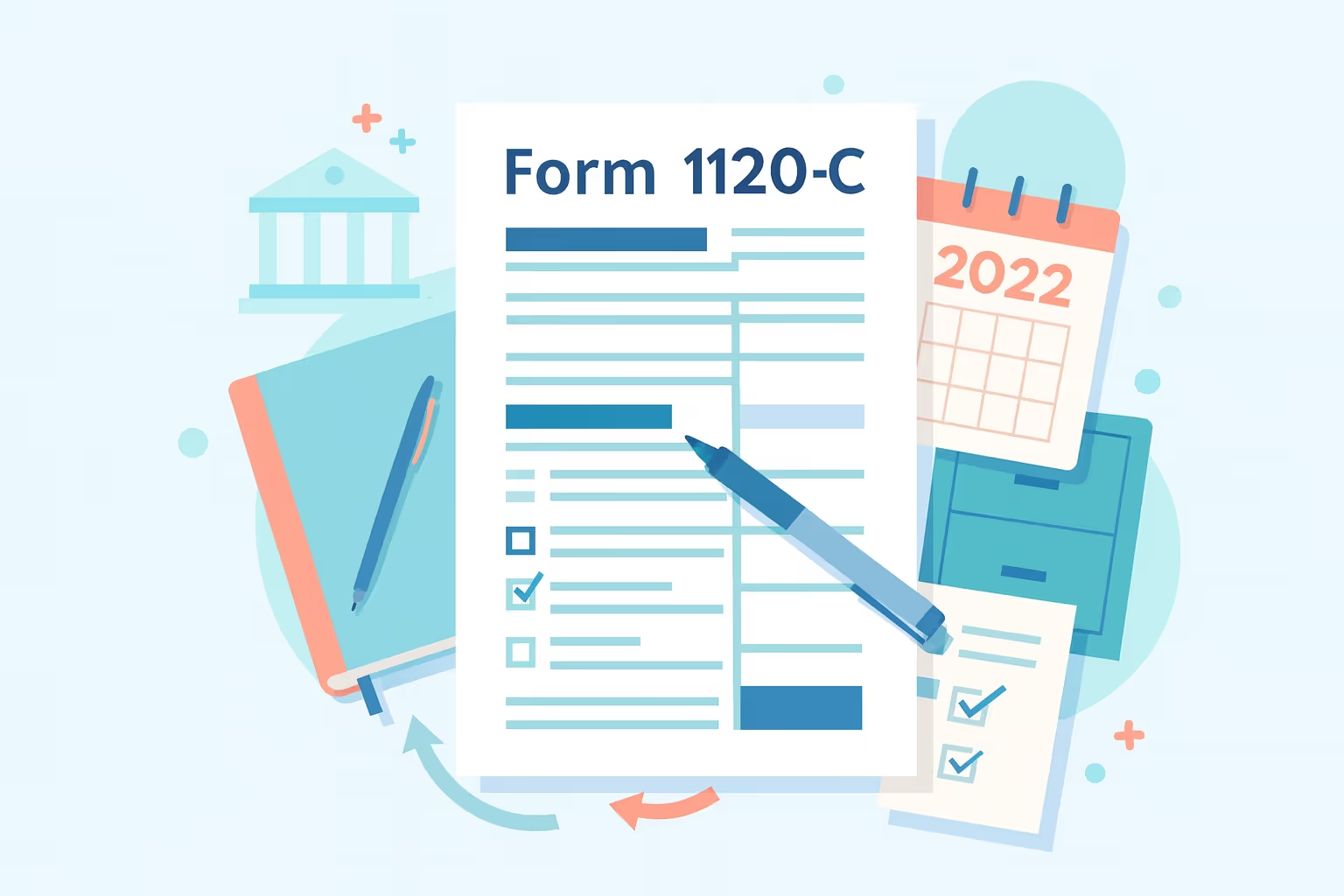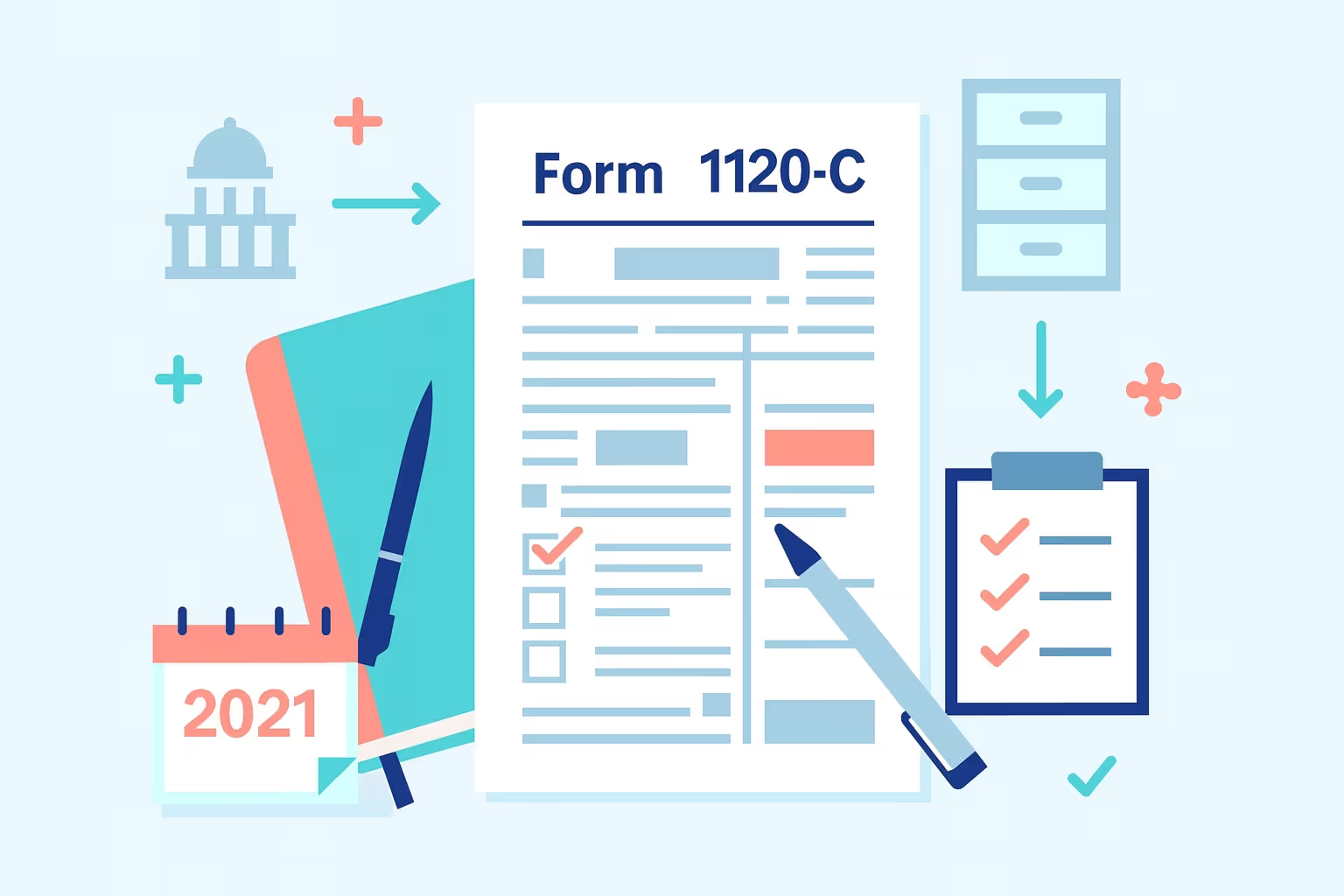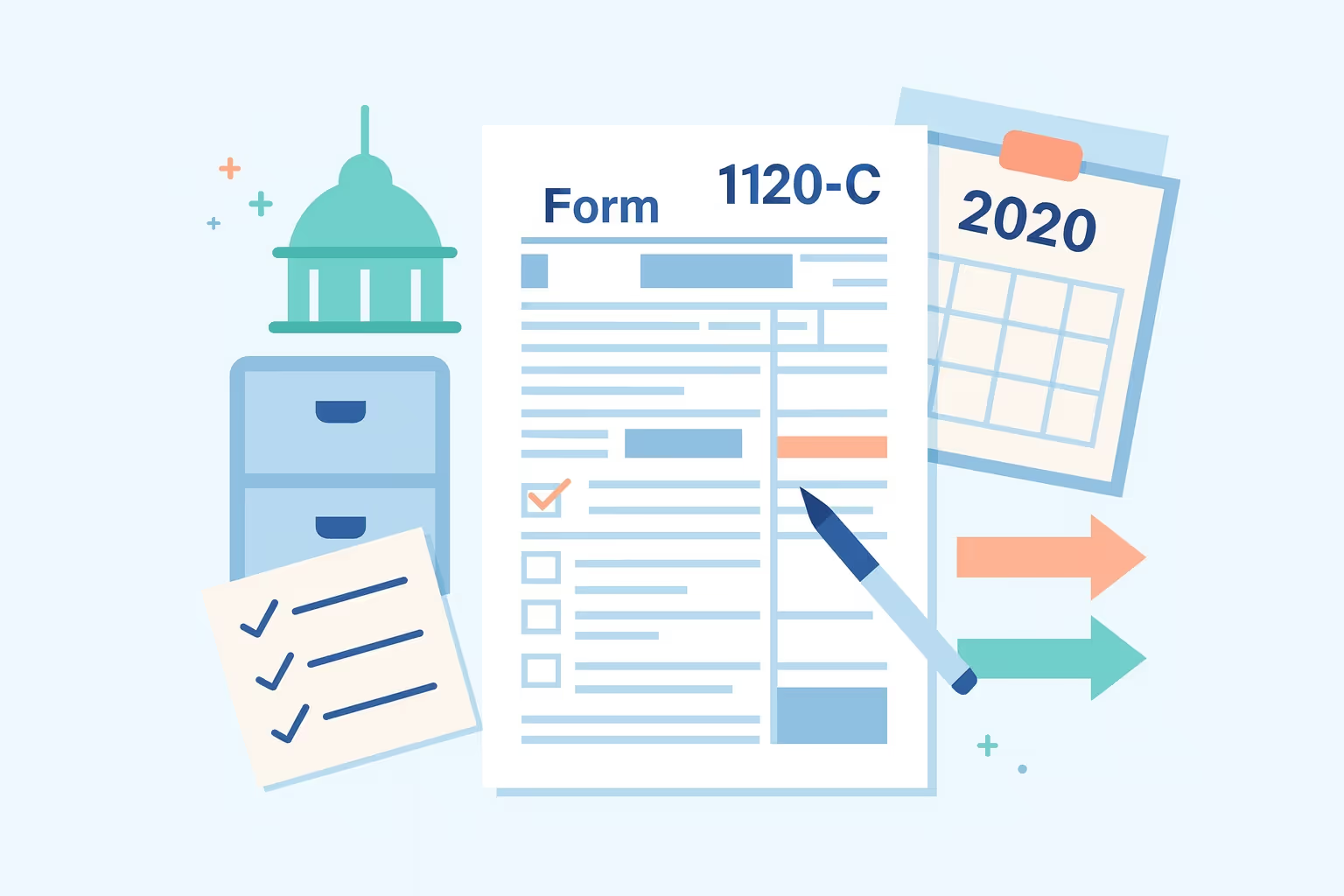
Cooperative associations are domestic corporations or foreign corporations engaged in member-focused business operations governed by Subchapter T of the Internal Revenue Code. These organizations must file Form 1120-C annually with the Internal Revenue Service to report taxable income, gross receipts, and patronage payments. Unlike standard C corporations, cooperatives distribute a portion of their earnings to members as patronage dividends, which must be accurately documented and reported to qualify for deductions.
The Internal Revenue Service outlines how cooperatives calculate net income, classify business expenses, and account for capital assets. Entities such as marketing, supply, and service cooperatives, as well as organizations submitting a consumer cooperative exemption application, must maintain detailed records for accounts receivable, gross profit, and shareholders' equity. Filing Form 1120-C ensures that each cooperative adequately discloses its income, expenses, and allocations in accordance with federal tax rules.
This article simplifies the 2013 filing process for Form 1120-C, helping taxpayers meet cooperative reporting standards. It explains how to deduct patronage dividends, identify other income, and remain compliant with record-keeping requirements. According to the IRS resource titled About Form 1120-C, all qualifying cooperatives are required to file a complete and accurate return each year.
Understanding Federal Income Tax Obligations for Cooperatives
Cooperative associations must understand how federal income tax applies to their unique structure under Subchapter T of the Internal Revenue Code. These organizations operate as domestic or foreign corporations engaged in cooperative business.
They allocate earnings among members through patronage dividends, which reflect each member’s participation in cooperative operations. The Internal Revenue Service requires accurate reporting of taxable income, gross receipts, and other income to ensure fair taxation across both patronage and nonpatronage activities.
Federal taxation for cooperatives differs from that of C corporations because earnings distributed to members may be deductible if they meet specific qualifications. The Internal Revenue Service outlines that net income must include business expenses, gross profit, and capital assets tied to cooperative operations.
Each cooperative must use a consistent accounting method to track revenue streams and determine taxable income. Understanding these distinctions is essential for correctly reporting both member-related and external transactions.
Cooperatives must carefully evaluate their tax reporting to comply with federal law and maintain eligibility for specific deductions:
- Patronage Dividends: Payments to members based on patronage that meet timing and documentation requirements may be deductible.
- Nonqualified Written Notices: Amounts issued without member consent are not deductible until redeemed.
- Tax Exempt Income: Includes specific interest or dividends from qualifying sources that reduce taxable earnings.
- Ordinary Income: Reflects operational profits before distributions, ensuring transparency in financial reporting.
- Debt-financed stock: Ownership interests purchased with borrowed funds require disclosure under applicable federal regulations.
- Business Expenses: Operating costs must be ordinary, necessary, and well-documented to qualify for deductions.
Cooperatives may also hold investments that generate taxable income or tax-exempt interest, depending on the source and structure of the investment. Transactions involving affiliated group members, wholly owned foreign subsidiaries, or foreign corporations engaged in cooperative activities must comply with federal reporting standards. All earnings, whether from domestic corporations received or foreign operations, contribute to total taxable income unless specifically excluded under law.
Filing Form 1120-C ensures the Internal Revenue Service recognizes the cooperative’s financial position, allocation methods, and deductions. Maintaining clear records for prior tax years, unappropriated retained earnings, and dividends paid promotes compliance and transparency. Each cooperative benefits from aligning its tax reporting with federal requirements to uphold accurate representation of net income and obligations.
Calculating Gross Income for Cooperative Associations
Accurately determining gross income ensures that cooperative associations comply with federal tax requirements under Subchapter T. Every cooperative must distinguish between income earned through member-based transactions and revenue generated from outside sources. Proper classification supports accurate reporting of taxable income, deductions, and patronage allocations. The Internal Revenue Service expects consistency in documenting each revenue stream, ensuring transparency across both patronage and nonpatronage activities.
Identifying Reportable Income Sources
Gross income includes all earnings before deductions, such as receipts from sales, services, and investment activities. Cooperatives must document gross receipts, gross profit, and other income derived from both member and non-member transactions. Examples include interest on deposits, rental income, and proceeds from the sale of capital assets.
Additional sources, such as dividends paid from domestic corporations received or returns from foreign corporations engaged in cooperative ventures, may also form part of total income. Accurate tracking of these items ensures compliance with the chosen accounting method for tax reporting.
Distinguishing Patronage and Nonpatronage Earnings
Cooperatives must classify each transaction as either patronage or nonpatronage income, based on the nature of the business relationship. Patronage earnings relate to operations conducted with or for members, while nonpatronage income stems from external sources.
Revenue from foreign corporation activities, specific preferred stock, or debt-financed stock often falls within nonpatronage categories. This distinction is critical when calculating deductions for patronage dividends and determining the cooperative’s overall net income.
Ensuring Documentation and Compliance
Maintaining complete and accurate records is essential for defending reported amounts and deductions during review. Cooperatives should maintain documentation that covers accounts receivable, unappropriated retained earnings, and capital assets to demonstrate proper income treatment and compliance with relevant accounting standards.
They must verify each entry aligns with the selected accounting method and reflects consistent reporting across prior tax years. Comprehensive guidance on reporting income categories and allocations is available in the IRS publication "Instructions for Form 1120-C" (2013), which outlines detailed line-by-line requirements for cooperative filers.
Completing the gross income calculation establishes a foundation for determining deductions, credits, and taxable distributions. By ensuring that every revenue source is reported accurately, cooperatives protect their eligibility for patronage-based deductions and prevent errors that may delay the processing of their returns. Explicit, well-documented income reporting supports both operational accountability and compliance with federal tax law.
Reporting Taxable Distributions and Form 1099-PATR
Cooperative associations must report all taxable distributions with precision to remain compliant under Subchapter T. These distributions include patronage dividends, cash allocations, and property transfers made to members. Each cooperative must issue Form 1099-PATR to every member who receives qualifying payments. Accurate reporting ensures consistency between the cooperative’s return and member filings, supporting both transparency and regulatory compliance.
Key Reporting Components
- Definition of Taxable Distributions: Includes every amount allocated or paid to members based on patronage transactions. Reportable distributions may take the form of cash, property, or written notices of allocation.
- Patronage Dividends: Payments reflecting members’ participation in cooperative business activity. These dividends are deductible only when properly documented and distributed within the allowable period.
- Qualified Written Notices: Allocations meet statutory consent and timing requirements for current-year deductions. Members must recognize these amounts as income upon receipt.
- Nonqualified Written Notices: Instruments that do not meet qualification rules. Cooperatives can claim a deduction only when these notices are redeemed, making record retention essential for accurate accounting.
- Cash Distributions: Payments made in currency, check, or direct deposit. Cooperatives must record these as part of the total patronage dividend paid for the year.
- Property Distributions: Transfers of tangible or intangible assets distributed instead of cash. Each distribution must reflect fair market value on the transaction date.
- Debt-Financed Stock: Shares purchased with borrowed funds may require allocation adjustments under federal regulations.
- Dividends Paid and Stock Dividends: Include both ordinary and extraordinary dividends associated with capital stock or retained earnings. Documentation should distinguish between shareholder types.
- Form 1099-PATR Requirements: Provide this form to each member receiving $10 or more in patronage-based payments. Guidance on eligibility, thresholds, and filing procedures is available in the IRS resource on Form 1099-PATR filing requirements.
- Backup Withholding Rules: Apply when taxpayer identification numbers are incorrect or missing. Cooperatives are required to remit withheld funds to the Internal Revenue Service.
Accurate reporting of taxable distributions confirms financial accuracy and member accountability. Maintaining comprehensive records strengthens audit readiness and supports future-year filings. Consistency in reporting ensures each cooperative reflects its actual earnings, deductions, and allocations across all member transactions.
Completing the Income Tax Return (Form 1120-C)
Filing Form 1120-C requires attention to detail and familiarity with cooperative-specific reporting standards. Each section of the return captures critical financial data, including taxable income, business expenses, and patronage dividends. Completing the form accurately ensures the Internal Revenue Service recognizes all allocations, deductions, and credits claimed under Subchapter T. The process outlined details each stage of preparation, enabling the cooperative to achieve compliance with federal tax requirements.
Step 1. Gather Essential Information
Before completing any entries, collect key financial documents and identification details. These include the employer identification number, business activity code, and accounting method used during the tax year. Gather prior-year returns, balance sheets, and records of gross receipts, gross profit, and net operating loss deductions. Verify member patronage records, dividend declarations, and supporting schedules for accuracy and completeness. Organized preparation streamlines the filing process and reduces the risk of reporting errors.
Step 2. Complete Basic Information Section
Enter the cooperative’s legal name, mailing address, and tax year. Indicate whether the entity is a domestic corporation or a foreign corporation engaged in collaborative activities. Provide the employer identification number and confirm the chosen accounting method, which can be either cash, accrual, or a hybrid method. This section also includes checkboxes for cooperative classification, such as nonexempt or farmers’ cooperatives operating under section 521.
Step 3. Report Gross Income and Adjustments
List all income sources, including gross receipts from business operations, dividends paid, and other income categories. Include capital gains, rent, royalties, and returns from foreign corporations engaged in cooperative activities. Record total gross profit after subtracting cost of goods sold, if applicable. Ensure that income allocations accurately reflect the division between patronage and nonpatronage transactions.
Step 4. Itemize Deductions and Business Expenses
Enter allowable business expenses that reduce taxable income. Include salaries, wages, rent, repairs, interest payments, employment credits, and depreciation. Document all expenditures tied to cooperative operations, such as administrative costs, taxes, and licenses. Identify deductible patronage dividends, qualified written notices, and cash distributions. Report any tax-exempt income separately to maintain transparency in financial statements.
Step 5. Complete Schedule H – Patronage Deductions
Schedule H calculates deductions available for patronage dividends and related allocations. Report dividends paid, qualified and nonqualified notices, and any amounts distributed in property. Include adjustments for debt-financed stock and capital assets used in cooperative operations. Verify all figures reconcile with board-approved resolutions and member records.
Step 6. Finalize Balance Sheet and Reconciliations
Prepare Schedules L and M-1 to reconcile book and tax records. Record assets, including accounts receivable, depreciable assets, and treasury stock, as well as liabilities such as bonds payable. Report unappropriated retained earnings and shareholders' equity to confirm total voting power and ownership percentages. Ensure retained earnings reconcile across prior tax years.
Step 7. Review, Sign, and Submit
Conduct a thorough review of all entries for accuracy. Confirm schedules, attachments, and disclosures are complete and internally consistent. Obtain signatures from authorized officers, retain copies for records, and submit the return to the Internal Revenue Service by the applicable deadline.
Completing Form 1120-C accurately demonstrates financial accountability and supports cooperative compliance. Careful preparation ensures all taxable income, deductions, and patronage payments are reported correctly. Maintaining detailed records supports audit readiness, while timely submission affirms the cooperative’s commitment to transparent tax practices.
Applying the Investment Credit and Other Adjustments
Cooperative associations may be eligible for several credits and adjustments that reduce their overall federal tax liability. Investment credit is one of the most valuable options, allowing organizations to claim incentives to purchase qualifying assets that support productive operations. Each credit must align with federal guidelines and relate directly to cooperative business activity. Filers must document all calculations and retain supporting schedules to demonstrate eligibility during the review process.
Investment credits and related adjustments often involve complex interactions with other tax provisions. Cooperatives must examine how these credits affect taxable income, prior-year minimum tax obligations, and net operating loss deductions. A detailed analysis ensures that the organization reports each adjustment accurately while maintaining long-term compliance. Consistent record-keeping also enables management to assess the financial implications of tax strategies across multiple periods.
- Investment Credit Eligibility: Applies to expenditures for depreciable assets, equipment, or facilities used in cooperative operations. Qualifying investments must be placed in service during the same tax year in which they are acquired.
- Foreign Tax Credit: Prevents double taxation on income earned through foreign corporations engaged in cooperative activities. Cooperatives must document taxes paid to foreign jurisdictions and allocate them appropriately.
- Alternative Minimum Tax (AMT): Requires calculation of a parallel tax system to ensure a minimum contribution. Adjustments under AMT may offset certain credits or deductions claimed on the standard return.
- Prior Year Minimum Tax Credit: Allows recovery of excess AMT paid in earlier years, reducing current tax obligations when applicable.
- Net Operating Loss Deduction: Enables cooperatives to offset current-year income using qualified losses carried forward from prior tax years.
- Tax Exempt Income Adjustments: Includes certain dividends, interest, or earnings from exempt sources that influence credit calculations and final tax due.
- Small Business Investment Incentives: Encourage reinvestment in qualified property or community projects authorized under the Small Business Investment Act.
Applying these credits accurately supports a cooperative’s financial position and ensures compliance with federal regulations. Each adjustment contributes to accurate reporting of taxable income, reduces errors, and improves long-term tax efficiency. Proper documentation and methodical review help ensure every claim withstands scrutiny and supports sustainable growth.
Patronage Dividends and Qualified Payments
Cooperative associations distribute a portion of earnings to members as patronage dividends, reflecting each member’s participation in the organization’s business. These payments form a critical part of cooperative taxation under Subchapter T, directly influencing taxable income and available deductions.
Understanding how to classify and document patronage distributions ensures accurate reporting and compliance with Internal Revenue Service requirements. Each category described below plays a distinct role in determining when a cooperative can deduct patronage dividends and recognize related member income.
- Patronage dividends represent returns of earnings allocated to members in proportion to the business conducted with or for them. These amounts reduce taxable income when they meet statutory requirements for timing, consent, and allocation. Each dividend must originate from patronage-sourced net income and reflect equitable treatment among members.
- Only domestic corporations operating on a cooperative basis can claim deductions for patronage dividends. The allocation must result from transactions with members and be approved by the board. Non-member transactions may generate taxable income but cannot produce deductible patronage dividends.
- Qualified written notices of allocation allow cooperatives to deduct patronage dividends in the current year. Members must consent to include the amounts in their taxable income, ensuring that matching treatment is provided between cooperative and member filings. Proper documentation, including signed consent agreements, confirms eligibility.
- Nonqualified written notices do not meet consent or timing standards for current-year deductions. The cooperative can claim the deduction only when it redeems the notice, while members recognize income upon redemption. Maintaining accurate records for all outstanding nonqualified notices is essential.
- Patronage dividends must be distributed within 8½ months after the close of the tax year to remain deductible. Cooperatives must track both cash and property distributions to ensure compliance with this statutory deadline. Late payments may disqualify the deduction and alter taxable income calculations.
- Dividends should appear on Schedule H of Form 1120-C, detailing the amount and form of each allocation. Supporting records must include board resolutions, member correspondence, and financial statements that confirm the net income available for distribution.
Patronage dividends and qualified payments embody the cooperative principle of returning earnings to active participants. Accurate classification, timely issuance, and proper documentation safeguard deductions and maintain transparency across member relationships. Establishing strong reporting practices ensures compliance while reinforcing equitable financial participation within the cooperative structure.
Common Filing Errors and Best Practices
Cooperative associations frequently encounter challenges when completing Form 1120-C due to the technical nature of cooperative taxation. Filing errors may lead to delayed processing, disallowed deductions, or IRS compliance reviews. Understanding the most common mistakes helps cooperatives strengthen their reporting accuracy and maintain compliance with the Internal Revenue Service. A structured filing approach and careful documentation improve both transparency and efficiency.
Many errors occur in areas involving income classification, the timing of deductions, and the lack of complete supporting records. Cooperatives should review every section of Form 1120-C before submission to verify consistency and correctness. Implementing preventive measures ensures the return accurately reflects the cooperative’s operations and financial position. The following points outline key filing issues and best practices for resolving them effectively.
- Reporting incorrect or missing employer identification numbers can delay processing or cause rejections. Each return must include a valid and current taxpayer identification number that matches the one on file with the IRS.
- Failing to classify income accurately between patronage and nonpatronage sources may distort taxable income. Cooperatives should separate and document all allocations to maintain compliance.
- Misstating gross receipts, net income, or other income can create discrepancies across schedules. All amounts must reconcile with accounting records and prior tax years.
- Omitting required schedules, including Schedule H or Schedule G, reduces transparency. Each mandatory schedule should be attached, completed, and reviewed before filing.
- Submitting returns without officer signatures or verification renders the filing invalid. Authorized representatives must sign after confirming the accuracy of every entry.
- Missing deadlines for distributing patronage dividends eliminates eligibility for deductions. Payments must occur within the required 8½-month period following the close of the tax year.
- Failing to comply with backup withholding rules when taxpayer identification numbers are incomplete or invalid can result in IRS enforcement actions. Cooperatives must withhold and remit funds as required by law.
- Failing to reconcile unappropriated retained earnings from prior tax years causes balance sheet inconsistencies. Each adjustment must align with the cooperative’s audited financial statements.
Developing a comprehensive filing checklist ensures every detail receives attention before submission. Assigning review responsibilities to experienced staff or engaging a tax professional strengthens quality control. Maintaining clear records, verifying computations, and adhering to reporting deadlines reinforce accountability. Consistent accuracy reflects sound governance and demonstrates commitment to federal compliance standards.
Frequently Asked Questions
What are taxable distributions received by cooperative members?
Taxable distributions received by cooperative members include patronage dividends, cash payments, and allocations of other property issued from cooperative earnings. These distributions must be reported on the appropriate tax form, such as Form 1099-PATR, during the applicable tax season. Members must include the value of these payments in taxable income unless the amounts qualify under specific exemptions outlined in the regulations section of the Internal Revenue Code.
When should a cooperative pay taxes for the 2013 filing year?
Cooperatives must pay taxes on Form 1120-C by the 15th day of the ninth month after the tax year ends if they meet section 6072(d) requirements. Nonqualifying cooperatives must file earlier, typically on the 15th day of the third month following the end of the reporting period. Timely electronic submission through EFTPS ensures compliance with regulations. Failure to remit payment by the deadline may result in interest accrual and additional charges assessed under applicable federal laws.
How does the Paperwork Reduction Act notice apply to Form 1120-C?
The Paperwork Reduction Act notice explains the estimated time and effort required to complete Form 1120-C accurately. It emphasizes the need for accurate data collection, including social security numbers, business purchases, and depreciation details for other depreciable assets. Compliance with this notice ensures cooperatives maintain transparency and reduce filing errors. The Internal Revenue Service uses this notice to help filers understand their recordkeeping and reporting responsibilities under federal law.
What reporting requirements apply to foreign persons involved in cooperatives?
A foreign person participating in a cooperative may receive taxable distributions or hold ownership interests subject to U.S. reporting. These individuals must disclose income and dividends derived from cooperative operations. Cooperatives must verify the foreign person’s tax identification number and report any applicable transactions in accordance with federal regulations. Proper disclosure ensures compliance with withholding rules and enables the accurate determination of income sourced from both domestic and foreign operations during the tax season.
Are charitable contributions deductible for cooperative associations?
Cooperative associations may deduct charitable contributions made to qualified organizations during the tax year, subject to statutory limitations. Contributions must support eligible causes and be documented adequately through receipts or acknowledgments. These deductions reduce taxable income when aligned with operational income, as outlined in the regulations section. Donations of cash, other property, or assets associated with business activities must be valued appropriately and recorded in the cooperative’s financial statements before filing.
How does ownership percentage affect voting stock and reporting?
Ownership percentage determines the distribution of voting stock among members and affiliated entities. Each cooperative must disclose total voting power and the percentage owned by major stakeholders. These disclosures ensure transparency in corporate governance and compliance with federal reporting standards. Accurate reporting of voting stock ownership aligns with the Internal Revenue Service’s requirements for corporate control, equity allocation, and verification of membership interests in cooperative tax filings.
How should former DISC dividends and tax-exempt trusts be reported?
Former DISC dividends and income from tax-exempt trusts must be recorded separately on Form 1120-C to ensure clarity in income reporting. These amounts contribute to total taxable income unless exempt under specific provisions. Cooperatives must track related earnings, allocations, and other depreciable assets supporting such investments. Proper classification under the regulations ensures compliance and an accurate determination of tax liability for the applicable tax season.

























